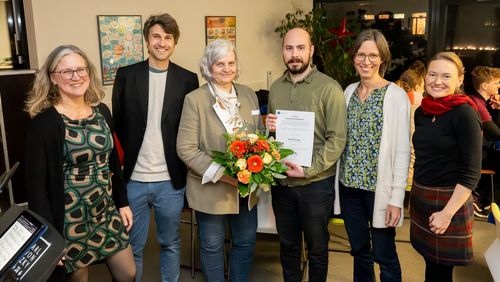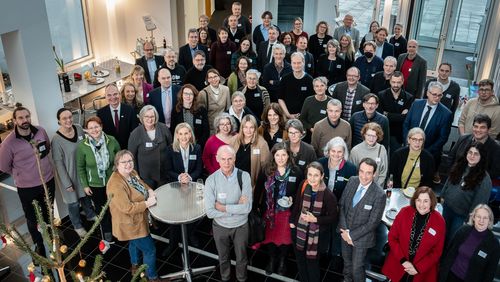The Universities of Groningen and Oldenburg have been cooperating for 40 years. In an interview, the two presidents Jouke de Vries and Hans Michael Piper talk about cross-border cooperation and pay tribute to the special relationship.
Mr. de Vries, the Rijksuniversiteit Groningen, RUG for short, looks back upon centuries of academic tradition, is considerably larger than the University of Oldenburg. For us, Groningen is the most important international partner, but your view on the cooperation may be different. Why is the University of Oldenburg interesting for you as a partner?
DE VRIES: For me, the University of Oldenburg is not just one of many partners, but a solid old friend and neighbour. And as we say in Dutch: A good neighbour is better than a friend far away. We have been cooperating successfully in research, teaching and transfer for four decades. Together we can contribute much more to the special region we both are located. Last year, I have started planning a "University of the North", and I consider the UOL an important partner in this plan.
For the University of Oldenburg, this is the longest-lasting international cooperation, agreed upon about six years after the university’s foundation. Mr Piper, what makes this partnership attractive for you?
PIPER: 40 years is a long time for a person. For the University of Oldenburg, which has not yet reached the age of a human being, a connection and friendship that lasts that long is naturally something special. Not only is this demonstrated in the close and important cooperation of the European Medical School, but also in the fact that we have a lot in common despite different cultural experiences. This has always appealed to me personally and it becomes apparent in the universities’ cultures.
The RUG and the University of Oldenburg cooperate on very different levels. In which respect can we learn from each other in particular, including by working together across the border?
DE VRIES: For me, the most important aspect is that the exchange of students, teachers and researchers contributes to intercultural understanding between the Netherlands and Germany. I often hear from ur students returning from Oldenburg that they have learned so much from a different cultural environment which is only 45 minutes away.
PIPER: The transfer of knowledge to the economy and population is immensely important for the regional roots of both universities. Oldenburg is particularly successful among medium-sized German universities in terms of spin-offs. I am sure that we can mutually benefit from our experience in this field.
How would you like to intensify cooperation?
PIPER: A particularly exciting topic is the different experiences in teacher training. In Germany, the degree programmes for the teaching profession are highly specialised - in the Netherlands, you build more on the respective professional culture. As in medicine, we can compare two very different approaches here and thus gain new impulses.
DE VRIES: Since cooperation does not stop at the border, I have invited my colleague Piper to participate in the steering group of the "University of the North", together with the chairs of the other partner institutions from the northern Netherlands. For me, it is logical that we include the Northwest of Germany and Oldenburg as partners in our plans because of the common challenges we face and opportunities we have recognised.
And what do you particularly appreciate about your German colleagues?
DE VRIES: I find them very polite and friendly, we Dutch can learn a lot from them.
Mr Piper, what do you particularly like about the Dutch?
PIPER: Being more laid-back like the Dutch would also do us good sometimes.
To take another look at our universities: How does a university rich in tradition remain "open to new approaches", to quote the Oldenburg leitmotif, even after 400 years?
DE VRIES: I believe it is in our academic DNA to be open to new approaches and directions. There is no other way, otherwise we would not have reached our 406th anniversary.
And vice versa, how does a young university manage to set international accents in research?
PIPER: Outstanding research requires that outstanding talents are appointed and supported. The University of Oldenburg has been very successful in this respect, for example in historic research, in hearing or marine research.
The largest joint project at present is the European Medical School (EMS). Why are cross-border medical studies and joint research in this field so important?
PIPER: Thanks to the cooperation with Groningen, Oldenburg has established a very successful study programme. In the course of studies, the EMS brings together experiences of health care in both neighbouring countries. The comparative research on the neighbouring health care systems within the framework of the Cross-Border Institute is also unique.
DE VRIES: The EMS is important for a vibrant region with high quality health care. I am convinced that it will continue to contribute to this by training good doctors and medical staff together.
Where will the cooperation between both universities take us within the next ten years?
DE VRIES: I am sure that we will work even more closely together, for example in a "University of the North". The border will continue to lose importance, will become even more virtual - perhaps even thanks to better train connections.
PIPER: I hope that in ten years' time we will be standing in the magnificent festival hall of the Rijksuniversiteit Groningen and signing the next cooperation agreement. For the Oldenburg side, another president will do that. I would be delighted to be invited to attend.
Interview: Deike Stolz



![[Translate to English:]](/fileadmin/_processed/0/9/csm_Academiegebouw_Groningen_NL_Wustje_kl_fbc6ecc59b.jpg)


